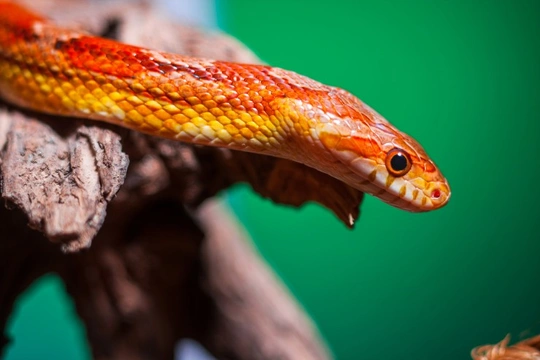
Why do snakes hiss and what does it mean?
If the average person was asked to describe a snake, they would probably mention the forked tongue and hissing sound they make fairly soon in their description, and the hissing sound is of course a very familiar one to anyone who keeps or handles pet snake, such as a corn snake or a king snake.
The sound of the hiss itself is fairly menacing and threatening-so much so that many other species of animals have evolved to produce a hissing sound of their own that emulates that of the snake to deter predators or see off an attacker if threatened-including of course cats!
But why do snakes hiss, how do they make the hissing sound and what does it mean, or why do they do it? These are all questions that new snake owners often find themselves asking, and so in this article we will attempt to answer them, and explain a little more about why snakes hiss and what it means. Read on to learn more.
How do snakes make the hissing sound?
Snakes are of course hugely different to humans and other mammals in terms of their anatomy and physiology, which makes everything from the way that they eat to the way they move to the sounds that they make and how they make them very different to ours.
An important part of the difference between snakes and mammals is how snakes breathe and swallow, and this depends on an organ called the glottis, which is located just behind the tongue in the snake’s throat. Snakes breathe through the glottis, which can open and shut, opening into the windpipe when the snake inhales a breath and closing afterwards. The glottis opens again when the snake breathes out normally and does not make a sound, but if the snake forces out air with a hard exhalation, a piece of cartilage in the glottis vibrates, causing the hissing sound, which is as such produced by the glottis and not the tongue, as some people think!
Do all snakes hiss?
All species and types of snakes have the same basic anatomy in terms of the construction of their mouth, throat and glottis, and so, all snakes are physically capable of hissing. However, there are a huge number of different species of snakes in the world and not all of them actually choose to make a hissing sound-although all of the common pet snake species that we have in the UK can and sometimes do hiss.
What does it mean when a snake hisses?
The hissing sound is one that a snake makes deliberately, and does not simply happen by accident-which means that when a snake does hiss, there is a reason for it, and the reason is usually in warning or to deter a threat.
However, not all snakes will do this, and whether or not a snake will hiss regularly or in any given situation comes down to a variety of factors. Snakes that grow very large don’t usually hiss a lot if at all, because their huge size poses sufficient deterrent to most predators, negating the need to warn them off.
Very poisonous snakes too tend to not hiss a lot, because the other animals and predators that live within their ecosystem know that they are dangerous, and best left well alone.
All snakes tend to avoid confrontation where possible rather than fighting or getting into a standoff, and so a snake is most likely to hiss if cornered or caught by surprise.
As part of the deterrent tools snakes have for keeping themselves safe, snakes of different species also use a range of other ways to warn off threats, such as flaring the hood in cobras, or rattling the tail for rattlesnakes, as well as lunging, biting, holding the head and body upright, and releasing musk-or several of these things at once, possibly alongside of hissing!
Do snakes hiss to communicate and speak to other snakes?
Snakes are not social animals, and they don’t use vocal cues to communicate with each other. Whilst snakes do of course come together to breed and sometimes, to hibernate and keep warm, they tend to be fairly solitary and not interested in talking to other snakes, and so if a snake hisses at another snake, it is almost certainly a warning or a threat.
Why do pet snakes hiss?
If you are attempting to pick up your pet snake or are doing something in their tank and they are hissing, they are not very happy about things and want to be left alone. If you do intend to handle your snake, it is important to acclimatise them to this so that they get used to it and do not find it overly stressful, but snakes are not like mammal pets such as cats and dogs, and do not need physical contact and affection.
If your snake is hissing at you, you should take this as a warning that your snake is annoyed or frightened, and stop what you are doing-before your snake gets upset or tries to bite you!



